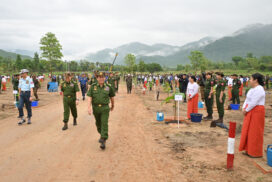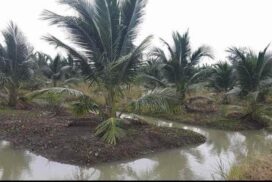Thriving forests are not just a legacy from the past but also the cornerstone of present benefits and future development. Forests play a pivotal role in the socioeconomic and sustainable development of a country.
It is imperative to manage forests systematically to ensure their sustainability, which in turn promotes the socioeconomic development of the nation. Forests provide numerous benefits as natural heritage to society, and it is the responsibility of all citizens to preserve and protect them for future generations.
Myanmar is fortunate to have extensive forest cover, accounting for 42.19 per cent of the nation, according to the UN Food and Agriculture Organization’s 2020 survey report. The government has designated 10 per cent of the nation as natural conservation areas. As of 25 March 2024, there are 59 natural conservation areas, covering 6.42 per cent of the country.
In achieving this goal, it is essential to minimize deforestation and forest degradation, promote reforestation, and ensure the sustainability of forests. Public awareness must be raised to encourage the planting of various tree species and improve the environment. Therefore, emphasis must be placed on the development of the forestry sector to successfully implement green economy, blue economy, and circular economy practices for global business operations.
Forests are an invaluable resource for humans, providing essential goods and services since time immemorial. Timber and other forest products are vital for the people of society in their daily routine. In addition, forests contribute to environmental conservation, mitigate climate change, regulate the water cycle, conserve water resources above and underground, maintain various species of biodiversity, and prevent soil erosion.
Thriving forests are closely linked to favourable weather conditions, agricultural and livestock farming development, and the tourism industry, particularly ecotourism service, which boosts the nation’s economy. The government manages forest conservation and protection at various levels, including forest reserves, protected public forests, protected forests, community-owned forests, and village firewood forests, in addition to commercial forest plantations established by private businesspersons, with considerations for economic, social, and environmental factors of the society.
The 15th sustainable development goal adopted by the United Nations emphasizes the protection, restoration, and sustainable use of terrestrial ecosystems, including the sustainable management of forests, combatting desertification, reversing land degradation, and halting biodiversity loss. Indicators for this goal include the remaining forest area, desertification, and the risk of species extinction.
In achieving this goal, it is essential to minimize deforestation and forest degradation, promote reforestation, and ensure the sustainability of forests. Public awareness must be raised to encourage the planting of various tree species and improve the environment. Therefore, emphasis must be placed on the development of the forestry sector to successfully implement green economy, blue economy, and circular economy practices for global business operations.













